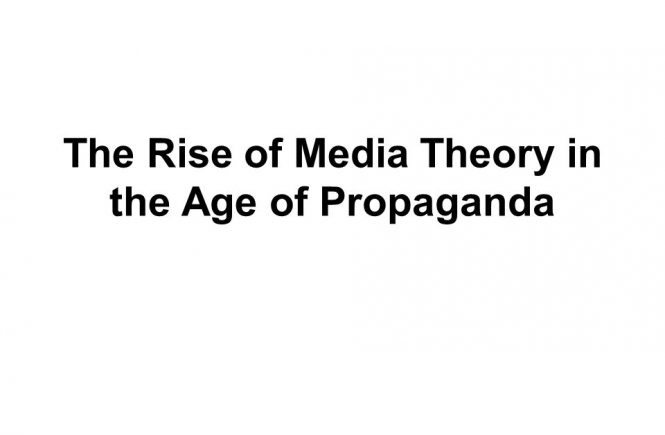MASS COMMUNICATION THEORY Foundations, Ferment, and Future (Book) Chapter#4: THE RISE OF MEDIA THEORY IN THE AGE OF PROPAGANDA (Review) Muckraker Crusading journalist, typically challenging the powerful on behalf of those less so. Propaganda No-holds-barred use of communication to propagate specific beliefs and expectations. White propaganda Intentional suppression of potentially harmful information and ideas, combined with deliberate promotion of positive information or ideas to distract attention from problematic events. Propaganda theorists abandoned idealism in favor of strategies they regarded as realistic and scientific. Propaganda must be resisted by whatever means possible. Even though the threat of propaganda was great, there might be a silver lining to this cloud. If we could find a way to harness the power of propaganda to promote good and just ideals, then we would not only survive its threat but have a tool to help build a better social order. This was the promise of […]
LIBERTARIANISM REBORN Propaganda
LIBERTARIANISM REBORN Propaganda By the end of the 1930s, pessimism about the future of democracy was widespread. Most members of the old-line elites were convinced that totalitarianism couldn’t be stopped. They pointed to theories like those of Lasswell and Lippmann as proofthat average people could not be trusted. The only hope for the future lay with technocracy and science. In the next chapter, we will trace the development of theories that arose in opposition to these technocratic views. Advocates of these emerging ideas didn’t base their views of media on social science; rather, they wanted to revive older notions of democracy and media. If modern democracy was being threatened, then maybe the threat was the result of having strayed too far from old values and ideals. Perhaps these could be restored and modern social institutions could somehow be purified and renewed. Theorists sought to make the Libertarianism of the Founding […]
MODERN PROPAGANDA THEORY
MODERN PROPAGANDA THEORY Consider the Hippler and Sproule characterizations of propaganda from earlier in this chapter: simplify a complex issue and repeat that simplification; use covert, massively orchestrated communication; and use tricky language to discourage reflective thought. Some contemporary critical theorists argue that propaganda conforming to these rules is alive and well today and that it is practiced with a stealth, sophistication, and effectiveness unparalleled in history. They point to a number of “natural beliefs” that have been so well propagandized that meaningful public discourse about them has become difficult if not impossible. Political discourse and advertising are frequent areas of modern propaganda study, and the central argument of this modern propaganda theory is that powerful elites so thoroughly control the mass media and their content that they have little trouble imposing their Truth on the culture. Close your eyes and think welfare. Did you envision large corporations accepting government […]
THE INSTITUTE FOR PROPAGANDA ANALYSIS
Should the power of propaganda be used for democratic ends (the Lasswell/Lippmann view), or because propaganda, by its very existence, was antidemocratic, was education the best way to deal with it (the Dewey view)? The disagreement over the proper place of propaganda in a democracy was no theoretical exercise. Social scientists believed the fate of the country, the world in fact, rested on its outcome. In 1937, the threat of external propaganda was so great that a group of social scientists, journalists, and educators founded the Institute for Propaganda Analysis with the goal of orchestrating a nationwide educational effort to combat its effects. During the four years of its existence, the institute was quite productive, generating numerous pamphlets, books, and articles explaining how propaganda works (read more about propaganda techniques in the box entitled “Applying the Seven Propaganda Techniques”). The institute was successful in developing an antipropaganda curriculum adopted by […]
REACTION AGAINST EARLY PROPAGANDA THEORY
Lasswell and Lippmann’s propaganda theories seemed to carry the weight of realworld proof—the globe had been engulfed by a devastating world war, The War to End All Wars in fact, yet global turmoil continued to rage. These conflicts were infused with sophisticated and apparently successful propaganda. Yet there was opposition. One prominent critic of propaganda theory was philosopher John Dewey. In a series of lectures (Dewey, 1927), he outlined his objections to Lippmann’s views. Throughout his long career, Dewey was a tireless and prolific defender of public education as the most effective means of defending democracy against totalitarianism. He refused to accept the need for a technocracy that would use scientific methods to protect people from themselves. Rather, he argued that people could learn to defend themselves if they were only taught the correct defenses. He asserted that even rudimentary public education could enable people to resist propaganda methods. Dewey […]
WALTER LIPPMANN’S THEORY OF PUBLIC OPINION FORMATION
WALTER LIPPMANN’S THEORY OF PUBLIC OPINION FORMATION. Throughout the 1930s, many other members of the social elite, especially those at major universities, shared Lasswell’s vision of a benevolent social science–led technocracy. They believed that physical science and social science held the keys to fighting totalitarianism and preserving democracy. As such, Lasswell’s work commanded the attention of leading academics and opinion leaders, including one of the most powerful opinion makers of the time—Walter Lippmann, a nationally syndicated columnist for the New York Times. Lippmann shared Lasswell’s skepticism about the ability of average people to make sense of their social world and to make rational decisions about their actions. In Public Opinion (1922), he pointed out the discrepancies that necessarily exist between “the world outside and the pictures in our heads.” Because these discrepancies were inevitable, Lippmann doubted that average people could govern themselves as classic democratic theory assumed they could. The […]
